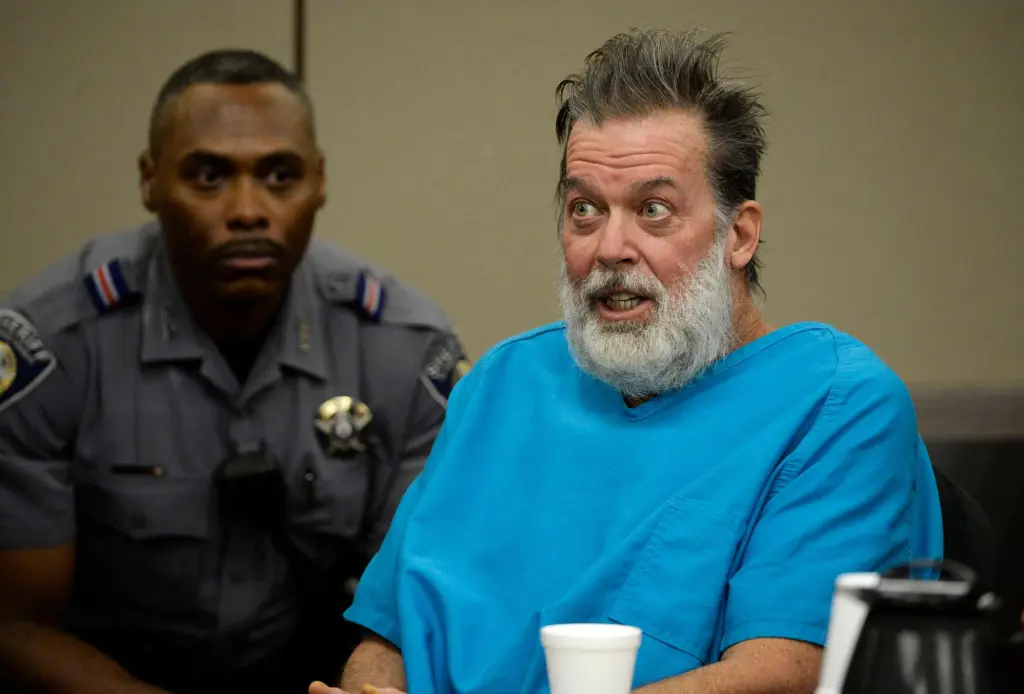
The man charged with carrying out a mass shooting at a Colorado Springs abortion clinic a decade ago is still mentally incompetent to stand trial and it is unlikely additional treatment will improve his condition, a federal judge ruled Wednesday, in a decision that will likely permanently stall the federal case against the suspected shooter.
Robert Dear, 67, is accused of killing three people and wounding nine others at a Planned Parenthood clinic in Colorado Springs in 2015. He is charged with both state and federal crimes connected to the attack, but has long been considered too mentally ill to go through the court process — that is, he has been consistently found incompetent to stand trial.
On Wednesday, U.S. District Judge Robert Blackburn found Dear to be both incompetent and unlikely to be restored. The ruling, which was agreed to by the defense and prosecutors after a doctor’s opinion in August, starts a process in which Dear will be committed long-term to a mental health facility in Missouri.
Federal prosecutors stopped short of dismissing the charges against Dear, however, and instead asked that the case be set for a status conference as his treatment continues. Victims in the attack sought to offer comment in court Wednesday, but Blackburn denied their requests to be heard.
Dear appeared virtually from the facility in Missouri on Wednesday, resting his handcuffed hands on his stomach during the hearing. He did not speak.
Dear, who confessed to the mass shooting, was charged with murder in state court in 2015, and with federal crimes in 2019, after he was found incompetent in the state case. He has for years refused medication for his diagnosed mental illnesses. In 2022, Blackburn ordered that Dear be medicated against his will. Federal prosecutors believed doing so would restore him to competency.
Dear, who called involuntary medication a “chemical lobotomy,” challenged that order all the way to the U.S. Supreme Court, which in February refused to take up the case. Blackburn then ordered that Dear’s involuntary treatment go forward, and the involuntary medication started in April.
A doctor who evaluated Dear in August found the treatment had not successfully restored Dear to competency.
A competency evaluation considers whether a criminal defendant is mentally ill or developmentally disabled, and whether that mental illness impedes the defendant’s ability to understand the court process. Rooted in the constitutional rights to due process and a fair trial, competency centers on two prongs — whether defendants have a factual and rational understanding of the proceedings, and whether defendants are able to consult with their attorneys and assist in their own defenses.
Experts have previously testified that Dear understood the facts and circumstances of his case but was still incompetent to proceed because he could not assist in his own defense.
Competency refers only to a defendant’s current mental capacity and is distinct from an insanity defense, which focuses on the defendant’s mental state at the time of the alleged crime.
Dear is accused of attacking the Planned Parenthood clinic on Nov. 27, 2015. Authorities believe he intended to wage “war” on the clinic because the staff performed abortions. He arrived armed with four SKS rifles, five handguns, two more rifles, a shotgun and more than 500 rounds of ammunition, according to the U.S. Attorney’s Office.
Authorities believe Dear first shot at people near his truck, then shot people in front of the clinic, then barged inside and continued shooting. Twenty-seven people who were inside the clinic at the time hid until they could be rescued by law enforcement, according to the office.
Dear fired 198 rounds in the attack and tried to blow up propane tanks in order to take out law enforcement vehicles during a five-hour standoff.
Those killed were Ke’Arre Stewart, 29, Jennifer Markovsky, 36, and Garrett Swasey, 44, a campus police officer who responded to the clinic after hearing there was an active shooter.



